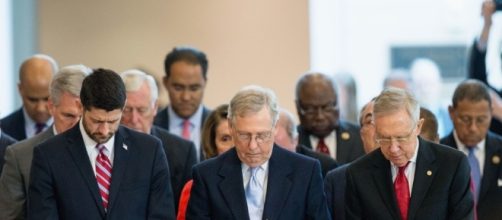The newly sworn GOP led House of Representatives, under pressure from President-elect Donald Trump, Speaker Paul Ryan and California Republican Congressman Kevin McCarthy, voted Tuesday to reverse its Monday vote to appoint a congressional ethics watchdog as part of an effort to "gut" the Office of Congressional Ethics (OCE). Monday's vote came in the wake of widespread concern over the need to investigate Russian involvement, under the leadership of Vladimir Putin, in the hacking of emails of the DNC (Democratic National Committee).
Investigation needed
Members of Congress and Senators from both sides of the aisle, including Senator John McCain, (R,Ariz.), Senator Charles Schumer, (D, N.Y.), House Minority Leader Nancy Pelosi, (D, Calif.), Senator Elizabeth Warren, (D, Mass.), and countless others, have been calling for a swift, thorough and bipartisan investigation into the email hacking crisis and other related ethical violations.
McConnell distrusts Russia
Senate Majority Leader Mitch McConnell let his views on Russia known a few days ago when he emphatically stated, "Russia is not our friend," (NBC News, 12/30/16). McConnell made that statement in response to claims by Trump that he will undo sanctions imposed on Russia by President Barack Obama for its involvement in the DNC email hacking scandal.
Trump puts pressure on Congress
Despite promises from members of Congress to launch a comprehensive investigation into the hacking issues, pressure from Trump won out. On Tuesday, after insistence from Trump via Twitter that Congress should be concentrating on other matters, such as lowering taxes and repealing the Affordable Care Act (Obama Care), the House voted to reverse Monday's bipartisan vote and not appoint a congressional ethics watchdog after all.
When asked if the continued pressure from Trump played a role in the vote to reverse the appointment of ethics watchdog, Rep. Steve King, (R, Iowa), said: "Yes, it animated the press," (ABC News, 1/3/17). The obvious implication of King's remark was that once the press is animated, that Congress follows suit and makes changes.
With all that Congress has to work on, do they really have to make the weakening of the Independent Ethics Watchdog, as unfair as it
— Donald J. Trump (@realDonaldTrump) January 3, 2017
Implications of the vote
The implications of the vote go beyond simply not appointing the ethics watchdog. As GOP members of Congress see it, the implications of Tuesday's vote are that the independence of those probing into the email hacking issue will be maintained because Congress will not be calling the shots and attaining intelligence reports from their own, appointed ethics watchdog. Republicans on Capitol Hill, including Rep. Dave Brat, (Va.), state that their constituents have been demanding that the investigation be conducted by people who are totally independent from Congress, the White House and all other government bodies and agencies.
Democratic members of Congress have a completely different view of the implications of the vote. Nancy Pelosi bluntly stated: "Evidently, ethics are the first casualty of the new Republican Congress," (ABC News, 1/3/17). Democrats feel that the watchdog working under the broad umbrella of Congress would have provided Congress with much needed information and would have been instrumental in uncovering the source(s) of the email hacking fiasco.
Trump weighs in on North Korea's nuclear threat
Meanwhile, President-elect Trump responded via Twitter to North Korean Dictator Kim Jong-un's assertion that he soon will have the nuclear capability of launching a nuclear attack against the United States. Trump tweeted: "It won't happen." However, Trump, who has less than two months training on foreign affairs and intelligence matters to date, did not specify how and why he is able to provide such assurances to the American People. In prior responses to questions on his confidence in his foreign policy matters, the former "Apprentice" host has sufficed only to say that he "knows more" than the American People. We shall see.

